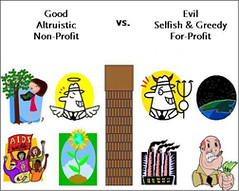Is it possible to be right and wrong at the same time?
Steven Silvers is the principal at Denver-based GBMS, Inc., a group of professionals who “understand the complex nexus of business, government, media and community in which organizations operate today.” And, as focused as he is on complex issues, his well-written post says the Whole Foods Market, Inc. crisis might not qualify. On one hand, he is very, very right.
There was little need for the Public Relations Society of America (PRSA) to send out a
news release about "reputation impact of undisclosed-identity executive internet postings."
"Corporate executives in all areas of a company must be acutely aware of the ethical implications of communications they initiate, including those under the auspices of being a ‘private citizen,’" said Rhoda Weiss, national chair and CEO of PRSA, in the release (highlighted by Silvers) that aims to capitalize on the case with reactive comment.
Most people get that, I think, which is why Silvers proposes that the most simplified version of the Mackey study is “smart people sometimes do stupid things.” Then he goes on to write a better version of the release: “Don’t post comments on the Internet promoting your company’s stock and slamming your competitors while pretending to be someone else. This is wrong. You could cause a huge PR problem for your company. You’ll probably get sued, and you might be breaking the law. …”
It made me smile, before departing from his assessment a bit. It would be simple, but nowadays things have consequences that are not confined to where they belong. This will not be confined to Mackey. This will not be confined to Whole Foods Market. And this will not be confined to, well, anything.
The consequences, as expected, are likely to be tossed about by folks like
Andrew Keen in his admittedly biased war against anonymity and amateurs on the Web. And perhaps, they will even reinforce the call for a code of conduct. And perhaps, there will be some new legislation. And perhaps, we’ll polarize it all.
“We have the most protected, covered, cautious and public relations-barricaded generation of leaders in history. Today’s tightly controlled, artfully packaged executives want to release and spout off, and they somehow think this is a forum where they’ll be held less accountable,” says Jeffrey A. Sonnenfeld, a professor of corporate governance at Yale. Indeed, and executives are not alone in feeling this way."It doesn't seem likely that investors who may have read these chat rooms would have had reason to act, thereby materially affecting the stock price, because the CEO's identity seemed to be concealed and the materiality of the comments made looks low," Stephen C. Chick, JPMorgan, wrote in a client note,
adding that while Mackey's actions "lack judgment," they are unlikely to affect Whole Foods' stock price.
And there it is. Why is this case study complex? Under the surface of simplicity resides the very foundation of an increasingly challenging issue caused, in part, by public relations’ attempt to mold people into something they are not; the media’s shift to be less concerned with finding the truth and more concerned with gathering up polarized viewpoints; and the public’s desire to create labels for everyone but themselves, good or bad.
The concept that “perception is everything” has permeated every facet of our society to such a degree that most people are increasingly judgmental about the actions of others. And perhaps, it is from this very place where the desire to be anonymous in today’s society seems to have very little to do with people wanting to behave badly and much more to do about their fear of being judged.
Adding rules and increasingly strict guidelines on the Web will only make it worse. I propose our time and energy is much better placed in educating people that it doesn’t make much sense to lend anonymous sources credibility beyond a single comment. While some have better intentions, others have agendas.
"They [the FTC] are quoting rahodeb in some of their legal documents and no doubt seek to embarrass both me and Whole Foods through these disclosures," Mackey has said. In fact, Mackey reports he had fun doing it, implies that he has no regret or remorse, and doesn’t seem to know the difference between making casual anonymous comments about his competitor and manipulating stock.
Is it because he is eccentric or ignorant? Don’t be silly. Mackey isn’t typical, but he isn’t stupid either. He knows that the day he admits that what he did was wrong and apologizes for it will be the same day that the Securities Exchange Commission (SEC) will no longer need to prove that Mackey knowingly violated securities law, intentionally using his anonymous postings to manipulate price. To be clear, of course what Mackey did was wrong. But virtually every outcome in this case will have little to do with reality and much to do with perception.
The Federal Trade Commission’s ability to prevent the merger will be based on perception. The outcome of the SEC investigation will be based on the determination of motivation, which will be based on perception. Shareholders will decide to buy or sell Whole Foods Market stock based on their perception. And the argument whether anonymity might be protected or abolished will be based on perception. It’s all based on perception because we live in a world that is increasingly focused on, well, perception.
After years of watching us trend toward creating pristine perceptions while nurturing the fear of being judged by others (who might discover the "truth"), maybe it’s time we remember that it is much more dangerous to allow the perception of a personal brand to drift dangerously away from reality and toward some idealized label than it is to manage a brand that represents who we really are; good, bad, or indifferent. (As even Albert Einstein once confessed, he only combed his hair that way for the benefit of the media.)
Or, in other words, Mackey might have considered it would have been equally “fun” to post his comments as himself. People would have the perception he was wacky (they do anyway) and there would be no crisis. But that's the simple part. The harder part is recognizing this issue is complex because we have made the environment complex.
Once we hung horse thieves, now we try to understand and justify them. Once we sought truth, now we celebrate opinion. Once people said what was on their minds, now they hide their thoughts unless protected under the veil of anonymity. Once we shopped because eating dinner with our family was fun; now we ask Whole Foods Market to make it fun for us. Simple indeed.





















